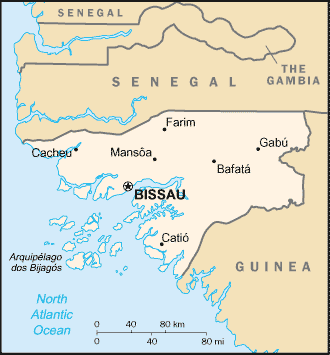 |
usa | world | animals | vocabulary | health | science | math | history |
Guinea-Bissau
Map Courtesy CIA World Factbook
Guinea-Bissau was once the kingdom of Gabù, part of the Mali Empire; parts of the kingdom subsisted until the 18th century. Though the rivers and coast of this area were among the first places colonized by the Portuguese, who began the slave trade in the 17th century, the interior was not explored until the 19th century. A rebellion beginning in 1956 by the African Party for the Independence of Guinea and Cape Verde (PAIGC) consolidated its hold on the country by 1973. Independence was unilaterally declared on September 24, 1973 and was recognized by a 93-7 UN General Assembly vote in November , unprecedented as it denounced illegal Portuguese aggression and occupation and was prior to complete control and Portuguese recognition. Recognition became universal following the Portuguese revolution of 1974. The country was controlled by a revolutionary council until 1984. The first multi-party elections were held in 1994, but an army uprising in 1998 led to the president's ousting and the Guinea-Bissau Civil War. Elections were held in 2000 and Kumba Yala was elected. In September 2003 a coup took place in which the military arrested Yala, because "he was unable to solve the problems". After being delayed several times, legislative elections were held in April 2004. A mutiny of military factions in October 2004 resulted in the death of the head of the armed forces, and caused widespread unrest. In June 2005, Presidential elections will be held for the first time since the coup that deposed Yala. Yala has returned as the candidate for the PRS, claiming to be the legitimate President of the country. Former President Nino Vieira, deposed in the 1998 coup, also has returned as a candidate for one sect of the PAIGC. Many other candidates have declared for what may be a controversial election, with reports of an influx of arms in the weeks leading up to the election.
|
|||||||
 The Republic of Guinea-Bissau (República da Guiné-Bissau) is a country in western Africa, and one the smallest countries in continental Africa. It is bordered by Senegal to the north, and Guinea to the south and east, with the Atlantic Ocean to its west. Formerly the Portuguese colony of Portuguese Guinea, upon independence, the name of its capital, Bissau, was added to the country's official name in order to prevent confusion between itself and the Republic of Guinea.
The Republic of Guinea-Bissau (República da Guiné-Bissau) is a country in western Africa, and one the smallest countries in continental Africa. It is bordered by Senegal to the north, and Guinea to the south and east, with the Atlantic Ocean to its west. Formerly the Portuguese colony of Portuguese Guinea, upon independence, the name of its capital, Bissau, was added to the country's official name in order to prevent confusion between itself and the Republic of Guinea.